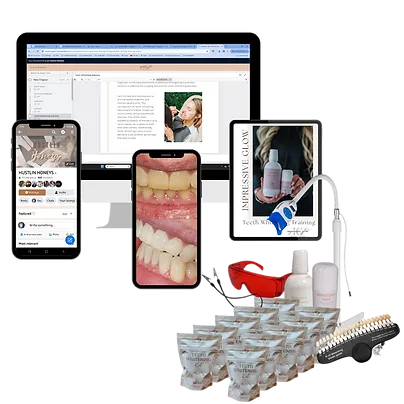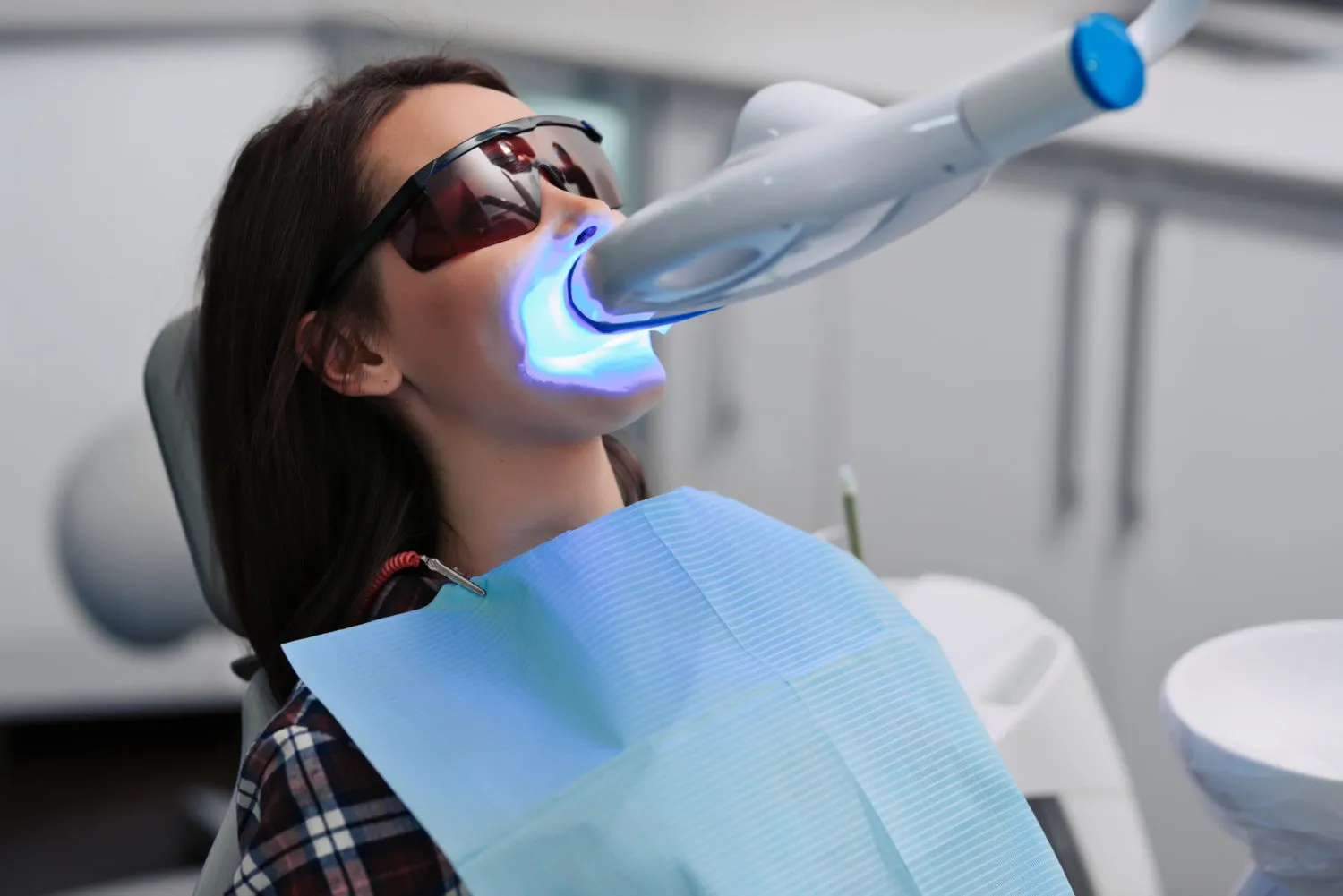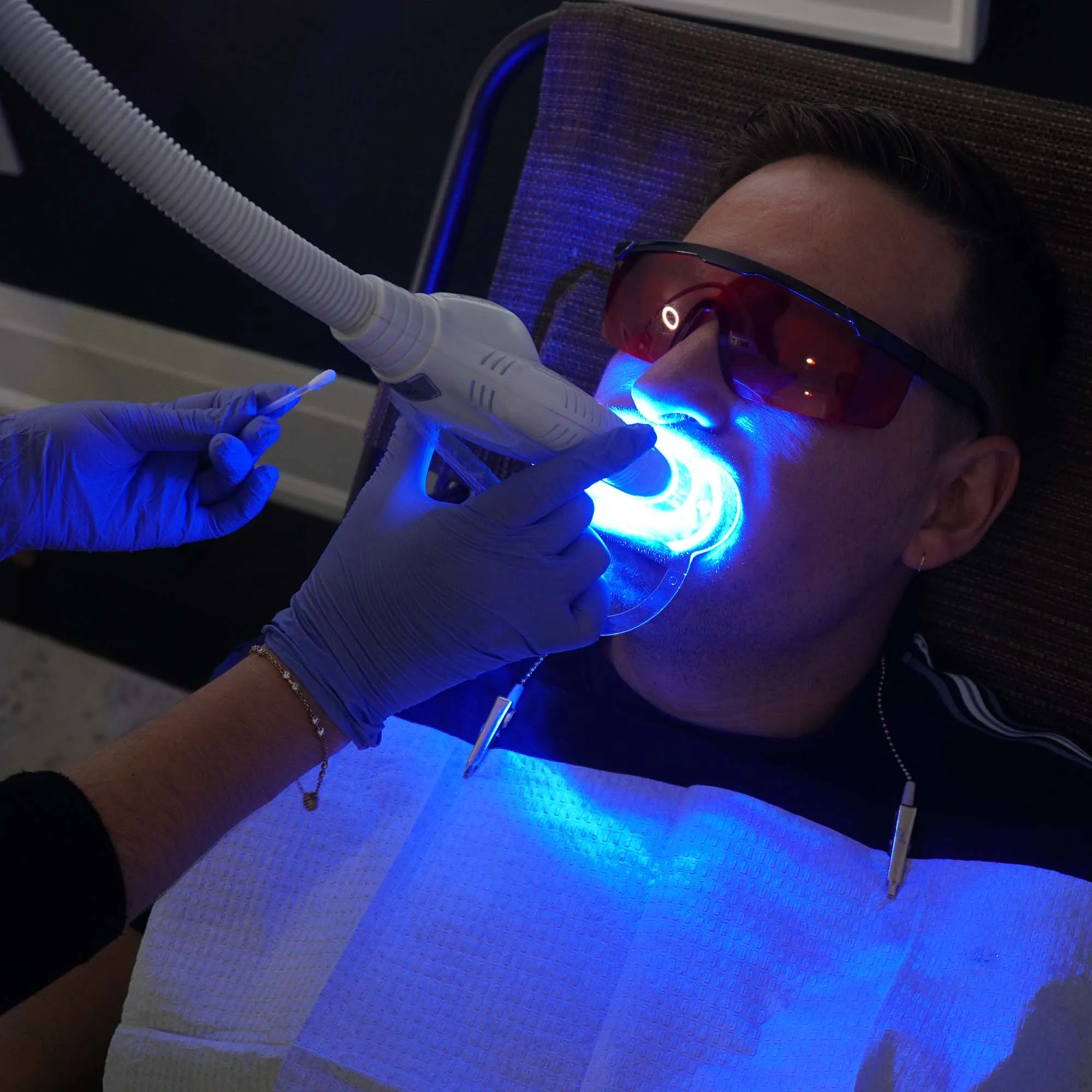What is a Teeth Whitening Course?
A teeth whitening course is a structured educational program designed to teach individuals the skills and knowledge necessary to safely and effectively perform teeth whitening procedures. These courses typically cover various aspects of teeth whitening, including the science behind it, different techniques, safety protocols, and client consultation. The goal is to provide participants with the expertise to offer professional teeth whitening services, ultimately helping clients achieve brighter, more confident smiles. These courses are important for anyone wanting to offer teeth whitening as a service to ensure they have the proper training to do so safely and effectively, preventing any harm to the client’s teeth or gums. They often blend theoretical learning with practical hands-on training, to prepare the student to enter the field prepared.
Who Should Take a Teeth Whitening Course?
Teeth whitening courses are suitable for a variety of individuals seeking to expand their professional skillset or start a career in the beauty and wellness industry. This includes aspiring dental hygienists, dental assistants, estheticians, and beauty professionals looking to add teeth whitening to their service offerings. Furthermore, individuals already working in related fields, such as spas or salons, can benefit from the additional training. Ultimately, anyone with a passion for helping others achieve a brighter smile and a desire to learn the techniques of professional teeth whitening should consider taking a course. Prior experience in the dental field is not always a prerequisite; however, a strong interest in aesthetics and a commitment to patient safety are essential qualities. Many courses welcome beginners and provide all the foundational knowledge needed to succeed.
Benefits of a Teeth Whitening Course

Enrolling in a teeth whitening course offers numerous benefits for individuals seeking to advance their careers or broaden their service offerings. The most significant advantage is gaining specialized knowledge and practical skills in a rapidly growing field. This includes a comprehensive understanding of different whitening methods, the ability to assess client needs, and the skill to perform treatments safely and effectively. Furthermore, certification from a reputable course enhances credibility and builds client trust, providing a competitive edge in the market. Additional benefits include the opportunity to network with industry professionals, access to the latest tools and techniques, and the potential to increase earning potential by offering a high-demand service. Ultimately, investing in a teeth whitening course can pave the way for a successful career in the beauty and wellness industry.
Career Opportunities After Certification
Completing a teeth whitening course opens the door to various exciting career opportunities. Certified professionals can find employment in dental offices, cosmetic clinics, med spas, and beauty salons. Many also choose to establish their own independent practices, offering mobile teeth whitening services or opening their own studios. The demand for teeth whitening continues to rise, creating ample opportunities for skilled technicians. Moreover, certification can serve as a stepping stone to further education and specialization in the field of cosmetic dentistry. Some may also pursue careers in sales or training, educating others on the latest teeth whitening products and techniques. The possibilities are extensive, and a certification can be a rewarding investment for those interested in making a significant impact in the beauty and wellness industry.
Different Types of Teeth Whitening Courses
Teeth whitening courses vary in their format, content, and duration, offering a range of options to suit different needs and preferences. Some courses focus on in-office treatments, providing hands-on training with professional-grade products and equipment. Others may specialize in at-home whitening techniques, teaching students how to create custom whitening trays and provide guidance to clients. Online courses are also available, offering flexibility and accessibility for those with busy schedules. These courses typically include video tutorials, interactive modules, and virtual assessments. Hybrid courses combine online learning with in-person practical sessions, providing a balanced learning experience. Selecting the right course depends on your career goals, budget, and desired level of hands-on experience. Researching different course offerings and reading reviews will help you to choose the program that best fits your needs.
In-office vs. Online Courses

The choice between in-office and online teeth whitening courses is an important consideration when planning your education. In-office courses offer the advantage of hands-on training under the supervision of experienced instructors. This allows you to practice techniques on live models, receive immediate feedback, and gain valuable practical skills. However, in-office courses can be more expensive and may require travel. Online courses, on the other hand, offer flexibility, allowing you to study at your own pace and from anywhere. They are often more affordable and provide access to a wider range of course materials. However, they may lack the same level of hands-on experience and require more self-discipline. Some courses offer a blended approach, combining online learning with in-person practical sessions. When deciding, consider your learning style, budget, and career goals.
Choosing the Right Teeth Whitening Course Near Me
Selecting the right teeth whitening course near you requires careful consideration of several factors. First, research the course curriculum and ensure it covers the topics relevant to your career goals. Look for courses that include both theoretical knowledge and hands-on training. Check the credentials of the instructors and the accreditation of the course. Consider the course’s format, whether it’s in-office, online, or a hybrid model, and choose the one that best fits your learning style. Evaluate the course cost and whether it includes materials, supplies, and certification fees. Read reviews from past students to gauge their experiences. Finally, make sure the course location is convenient and that it offers post-course support, such as job placement assistance or ongoing training. Doing your homework will ensure you choose a reputable course to help you achieve your professional goals.
Location and Accessibility
The location of a teeth whitening course is a crucial factor when making your decision. If you prefer an in-person course, consider the course’s proximity to your home or workplace and the ease of travel. Look for courses that offer flexible scheduling options to accommodate your lifestyle. Online courses provide greater flexibility regarding location, as you can study from anywhere with an internet connection. When choosing an online course, ensure that it is accessible on various devices, such as computers, tablets, and smartphones. Accessibility also extends to the course materials, which should be available in a format that is easy to understand and navigate. For in-person courses, consider the availability of parking, public transportation, and nearby accommodations if needed. Ultimately, select a course that is conveniently located and easily accessible for you, enabling a smooth and enjoyable learning experience.
Accreditation and Certification

Accreditation and certification are essential aspects to consider when choosing a teeth whitening course. Accreditation ensures that the course meets specific standards of quality and adheres to industry best practices. Accredited courses often provide more credibility and are recognized by employers. Certification, on the other hand, demonstrates that you have successfully completed the course and have the knowledge and skills to perform teeth whitening procedures. Look for courses that offer certifications recognized by reputable organizations in the beauty or dental industry. Verify the accreditation and certification details before enrolling, as this will impact your career prospects and the level of trust potential clients will place in your services. A course that is both accredited and provides a recognized certification will give you a significant advantage.
Course Curriculum and Content
The curriculum and content of a teeth whitening course should cover a comprehensive range of topics. The course should provide a strong foundation in the science of teeth whitening, including the anatomy of teeth, the different types of stains, and the mechanisms of action of whitening agents. It should also cover various whitening techniques, such as in-office treatments, at-home kits, and custom tray fabrication. A good course will include detailed information on client consultation, including how to assess a client’s needs, explain the procedure, and manage expectations. Furthermore, it should address safety protocols, contraindications, and potential side effects. Look for courses that provide hands-on training, allowing you to practice techniques under the guidance of experienced instructors. The content should be up-to-date with the latest industry trends, products, and best practices. Finally, ensure the curriculum aligns with your career goals and provides the necessary knowledge and skills to succeed.
Hands-on Training and Practice
Hands-on training and practice are essential components of a successful teeth whitening course. This practical experience allows you to apply the theoretical knowledge you’ve gained and develop the necessary skills to perform teeth whitening procedures safely and effectively. Look for courses that provide ample opportunities for hands-on practice, either on models or live clients. The best courses will offer a low student-to-instructor ratio, allowing for personalized feedback and guidance. Practice should include all aspects of the procedure, from client consultation and preparation to product application and post-treatment care. Before enrolling, inquire about the type of equipment and materials used in the hands-on sessions. The more practical experience you gain, the more confident and competent you will become in your abilities. This will prepare you to offer top-notch services, ensuring client satisfaction and contributing to the success of your business.
Course Cost and Payment Options

The cost of a teeth whitening course can vary significantly, so it is important to understand what is included in the price and how you can pay. Research the course fee thoroughly to ensure that it covers all necessary expenses, such as tuition, course materials, supplies, and certification fees. Some courses may offer payment plans or financing options, making them more affordable. When comparing course costs, consider the value you will receive, including the quality of the instruction, the hands-on training provided, and the certification you will earn. Check if there are any hidden fees, such as exam fees or membership dues. Inquire about any discounts or scholarships that may be available. Choosing a course within your budget while meeting your professional goals is important. Make sure you understand all the payment options and associated terms before enrolling in the course.
What to Expect During the Course
During a teeth whitening course, expect a combination of theoretical instruction, practical training, and hands-on practice. The course typically begins with an overview of the science behind teeth whitening, including the anatomy of the teeth, the different types of stains, and the mechanisms of action of whitening agents. You’ll learn about various whitening techniques, such as in-office treatments, at-home kits, and custom tray fabrication. You’ll also be taught about client consultation, including how to assess a client’s needs, explain the procedure, and manage expectations. A significant portion of the course will be dedicated to hands-on training, where you will practice the techniques under the guidance of experienced instructors. This will include learning the proper use of equipment, product application, and post-treatment care. In addition to the main content, many courses will also cover business aspects, such as marketing your services and building a successful business. Be prepared to actively participate, ask questions, and practice your skills to get the most out of the experience.
The Certification Process
The certification process for teeth whitening courses usually involves completing the course requirements and passing a final assessment. These requirements may vary depending on the course but generally include attending all classes, completing assignments, and demonstrating proficiency in hands-on techniques. The assessment may be in the form of a written exam, a practical exam, or a combination of both. The written exam tests your knowledge of the course material, including the science behind teeth whitening, the different techniques, and safety protocols. The practical exam assesses your ability to perform the teeth whitening procedures safely and effectively. Upon successful completion of the course and assessment, you will receive a certificate of completion. This certificate is proof that you have successfully completed the course and have the knowledge and skills to perform teeth whitening procedures. Ensure the certification is recognized by reputable organizations to validate your skills and build client trust.
Tips for Success in the Course

To maximize your success in a teeth whitening course, start by preparing beforehand. Review any pre-course materials provided by the instructor to familiarize yourself with the concepts. Actively participate in class by asking questions, taking notes, and engaging in discussions. Practice the techniques as often as possible during hands-on sessions. Seek feedback from instructors and other students to identify areas where you can improve. Develop good time management skills to keep up with the coursework and assignments. Build relationships with your classmates, as they can offer support and encouragement. Stay organized, keeping track of your progress and deadlines. Finally, approach the course with a positive attitude and a willingness to learn, and you’ll be well on your way to becoming a certified teeth whitening professional. These tips will help you succeed not only during the course but also in your future career.
Marketing Your Teeth Whitening Services
Marketing your teeth whitening services effectively is essential for attracting clients and building a successful business. Start by creating a strong brand identity, including a professional logo, website, and social media presence. Develop a marketing strategy that includes various online and offline marketing tactics. Leverage social media platforms like Instagram and Facebook to showcase your work, share testimonials, and run targeted ads. Utilize search engine optimization (SEO) to improve your website’s visibility in search results. Consider local advertising, such as flyers, brochures, and partnerships with local businesses. Offer special promotions and discounts to attract new clients and retain existing ones. Provide excellent customer service to build loyalty and encourage referrals. Ask clients for reviews and testimonials to build your reputation. Stay informed about the latest marketing trends and adapt your strategy accordingly. Consistent and targeted marketing efforts are key to building a thriving teeth whitening business.
Tools and Equipment Needed
To perform teeth whitening procedures, you’ll need the right tools and equipment. The essential items include a professional teeth whitening system, which typically consists of a bleaching agent (such as hydrogen peroxide or carbamide peroxide), a curing light or laser for in-office treatments, and trays for at-home whitening. You’ll also need protective eyewear for yourself and the client, retractors to keep the lips and cheeks out of the way, a shade guide to determine the client’s initial and desired tooth shade, and a saliva ejector to keep the area dry. Other helpful items include a dental mirror, a dental probe, cotton rolls, and a dental dam or liquid dam for gum protection. Additionally, you’ll need to have a well-lit, comfortable treatment area. When selecting equipment, prioritize quality and reliability. Make sure that the equipment meets safety standards and is easy to use. The correct tools are essential to providing great services.
Maintaining Your Certification

Maintaining your teeth whitening certification is vital to ensure your knowledge and skills remain current. Most certifications require ongoing education or continuing professional development (CPD) credits to stay valid. Research the requirements of your specific certification and the governing body. Stay updated on the latest industry trends, products, and techniques by attending workshops, seminars, and webinars. Participate in online courses and review journals and publications related to teeth whitening. Consider joining professional organizations for access to valuable resources and networking opportunities. Maintain accurate records of your CPD activities and keep them organized for easy reference. Maintaining your certification demonstrates your commitment to professionalism and staying at the top of your field. It increases your credibility with clients and assures them that you are knowledgeable.
Legal and Ethical Considerations
When offering teeth whitening services, it’s crucial to adhere to legal and ethical considerations. Familiarize yourself with the local regulations and laws regarding teeth whitening procedures. Ensure that you have the appropriate licenses and permits required to operate legally. Obtain informed consent from each client, explaining the procedure, potential risks, and expected results. Maintain patient confidentiality and comply with all privacy regulations. Use only approved products and follow the manufacturer’s instructions carefully. Avoid making any misleading claims about the results or the products you use. Prioritize client safety and well-being. Be honest and transparent in all your dealings with clients. Develop an ethical code of conduct and adhere to it in your daily practice. A commitment to ethical behavior builds trust with clients and enhances your professional reputation.
Staying Updated with Industry Trends
The teeth whitening industry is continually evolving. Therefore, staying updated with the latest trends is crucial for maintaining a competitive edge. Follow industry publications, blogs, and social media channels to stay informed about new products, techniques, and technologies. Attend industry trade shows, conferences, and workshops to learn from experts and network with other professionals. Participate in online courses and webinars to enhance your knowledge and skills. Continuously research the latest advancements in teeth whitening, such as new bleaching agents, light technologies, and treatment protocols. Adapt your services to incorporate the latest trends and offer your clients cutting-edge treatments. Embrace new technologies, such as digital smile design and intraoral scanners, to improve the client experience and outcomes. By proactively staying informed, you will be well-positioned to offer the best teeth whitening services possible.
